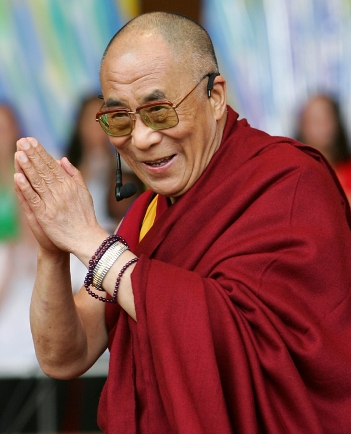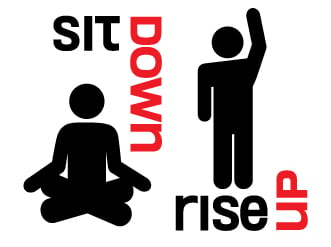by Jerry Kolber
I am going to continue exploring where I
left off last week with my question: is Buddhism a religion or a way to approach
living? The ONLY reason I think this
question matters is that the ideas that the Buddha presented 2,000 years ago –
a path to non-violence, compassion, mindfulness, and “right” behavior
– are urgently relevant to our world today, and I have encountered no other
system of personal exploration that offers such a straightforward approach to
liberating one’s mind from a swamp of craving and grasping. Unfortunately inaccurately calling the system
we refer to as Buddhism a religion means that a huge portion of the world’s
population will never bother to explore the teachings, because they already have
a religion.
But back to why this matters. I see little likelihood that people who have not
learned to at least make a real effort to be present, in this moment, have any
chance of long-term implementation of the behavior changes we need to stop
recklessly destroying our own mental and physical environment. Talking about “saving the planet” or “personal/communal evolution”
with a list of actions to do and behavior (and lightbulbs) to change, without
the tools to internally calibrate your mind to how to ACTUALLY change your
behavior, is no different than buying plans for a house and a set of tools and
hoping you can build it with absolutely no training or instruction in
carpentry, electrical work, or plumbing.
You’re just going to end up making a mess of things.
Buddha was careful to not present dogma, or rules, or external authority; his techniques simply create a mental
environment in which you are far more free to make informed choices about your
own behavior, by showing you where your own mind is stuck in habitual grooves and
shining a light on the tricks of your ego.
The Buddha’s teachings offer a uniquely
useful way to learn to take responsibility for your own mind, your own actions,
and your effect in the world. We start from the basic assumption that all acts
of destruction and violence stem from desire, which leads to craving. Craving happens when you drift from the
present moment, because the present moment is pure, complete, thick, and
inseparable from “you”. You are in the present moment, and alive, and
compete – there is nothing wanting in the present moment. Leaving this moment by wanting, desiring,
regretting, or fantasizing will by definition lead you to crave, to
dissatisfaction, because you have left the only place in the timeline (THIS
moment) that truly offers satisfaction and completion.
This is what the Buddha discovered, and he offers a pathway to discovering it for yourself. It isn’t religion, or
new age stuff – it’s hardcore, on the ground, slap in the face and wake you up to reality stuff.
Most religions require that you believe
there is a god or gods, said god(s) who created earth and the universe and all
creatures in it, and that this god(s) also created your religion – and that
following god(s) rules will lead to a good outcome in this world, and the next.
The creation myth at the center of each religion is challenging, because it
takes both a broad view – God created everything; and it simultaneously takes a
narrow view – THIS religion is the one true way. Even the most tolerant religions, when pushed
to the edge, have to say that their religion is accurate and their creation
story accurate and their description of God correct, because to say otherwise
would unravel the very fabric of the religion.
Buddha offers a path for anyone who seeks to walk it, regardless of other beliefs; religion sometimes offers a beautiful path, but it is most often in a gated community.
This is why people fight in the name of
religion – this identity with creation myth and god-identity can be so central to a person’s
life that it becomes impossible to tolerate someone taking an opposing view.
Sometimes innocent belief becomes twisted into an idea that true allegiance to
the god(s) requires destroying as many non-believers as possible. The fact
cannot be avoided that with all the religions on planet Earth, most of them chosen not by logic but by birth, we essentially have numerous bloodline tribes,
each with their own belief system, and not all of them (if any) can be
right.
Where major world religions begin with
creation myths, creators, and assertions that “this religion” is the
right way because that religion’s creator made it so, Buddha begins from
recognizing the common traits of the human condition and offering a precise,
logical, almost clinical, prescription for how to overcome this basic
dissatisfaction. In the process you will likely become a more compassionate, less
violent, less destructive human being.
There is no creator posited in the core teachings of the Buddha – but he
does not expressly say there wasn’t one.
You might postulate that to him, in this present moment, the human
condition at this moment alone is the only thing that matters, and to concern
himself with gods, creators, and the past was the opposite of what he was
teaching, no different than concerning himself with how well he slept last
night or whether to have red or white wine with dinner. It’s not an error of
omission – it’s an omission of the unnecessary.
Put another way, Buddhism followed to the
logical conclusion suggests that you are inextricably linked with everything
else in this present moment – there is no “you”, there is just “moment” which includes
“you” and everything else in this moment, and so you by definition are
also everything that you usually consider “not you” (including, for
instance, trees, beer, and God) – “you” cannot be “removed” from the
present moment without making it not the present moment anymore.
And so if there is a God, it is you, even
though you are not God. More to the
point – you can follow what the Buddha taught, and also believe in God, or not
believe in God, or not care either way – it doesn’t matter. It doesn’t matter because it’s totally
irrelevant to your experience of the present moment. When you start to really
pay attention to everything that’s NOT happening between your thoughts, even if it’s
only for a tiny fraction of a second, you have started truly taking responsibility for
being right here, right now, and to stop worrying about all kinds of stuff that’s
totally out of your control.
Though Buddha’s teachings migrated to and
were adopted by various cultures and people throughout history – including many
of us in the West today – the whole myriad of theistic and non-theistic
Buddhist traditions are collectively called Buddhism.
This leads to the inevitable conclusion
(because God always wins these arguments) that because some Buddhist traditions
have incorporated deities and theism into the teachings, therefore only
Buddhists who incorporate deities and theism into their practice are “true
Buddhists” and everything else is just a light. And just like every other
highly codified religion, there are Buddhist lineages that include gods, that
have run into the same problems that other religions do – smacking face first against the wall of
defensibility.
But the fact that you can
be Buddhist without having to follow one of those lineages – you can follow
Buddha’s teachings and believe or not believe in God – is an important point.
Can you be Christian and not believe in that religions description of
God?Jewish? Muslim? You cannot. Buddhism
uniquely does not present a unified version of god(s) – because god(s) are not
essential to the practice.
The fact that Buddha himself was careful
– in a time when theistic religions were all the rage – to neither embrace nor
reject the existence of god(s) is not a winning argument with those who want to
dig in and label Buddhism as a religion, to the detriment of the accessibility
of the Buddha’s teachings. They often seem more interested in defending the
particular cultural attachments that THEY have decided are “truly Buddhism”
than they are in the actual teachings of the Buddha himself.
When confronted by a non-Asian person with
the unassailable fact the Buddha himself so precisely did not accept or reject
the presence of god, they often claim racism, imperialism, even ignorance. But this does not change one simple thing. For Buddha’s teachings to work, no god is necessary – no creator, no higher power –
simply the desire to evolve your mind away from craving and into
non-craving. This is not a rejection of
god or religion – Buddha’s teaching are not theist, nor are they atheist. Though most of the people who practice
Buddhism today do so exclusively (largely because of the label of religion),
there is no reason to presume that his teachings are incompatible with
following a religion like Judaism or Christianity. Though his teachings may
lead a religious person to a different understanding of themselves and their
relationship to god, I would consider that a deepening of spirituality rather
than a contradiction.
Because Buddhism, by default, has been
described as a religion, it is unlikely to achieve the kind of widespread
acceptance that the Buddha’s teachings would require in order to achieve the
kind of sea change our world so badly needs, from a mindset of selfishness to
one of selflessness (or at least less-selfishness).
I know, based on last week’s response, that I’m going to get comments
that start with “What a load of crap, I don’t know where to
begin” or “Another ignorant
post from the Interdependence Project” or “Let me tell you why you’re
wrong”. But I’m not writing this to
start a fight or to push buttons.
I’m
writing this because my personal experience with Buddhist teachings has been so
transformative and relevant and provided so many specific tools to “build
a new house” in my mind, one that is indisputably creating better
conditions for myself and others on this planet. I cannot take credit for this
change – I must credit practicing Buddhism for beginning to reveal something that was
already within me, and within everyone.
I only came to study
the practice because I fortunately live in a cool spot and happened to stumble
on a community who also saw the value in applying Buddha’s teachings to our
daily urban lives. I think it’s a huge
shame that his teachings will remain unavailable to so many people who could
benefit from them, simply because a large portion of the Buddhist community is
so attached to a label.
So before you start piling on, ask
yourself this – if you are taking the position that Buddhism absolutely is a
religion, and I am taking a position that Buddhism does not have to be a
religion but can be practiced as one if you choose to follow a religion based
on the Buddha’s teachings, why does my
inclusionary approach cause you such stress? And those of you that agree, or have a personal experience with an overlap between Buddhism and religion, please share your stories too.

